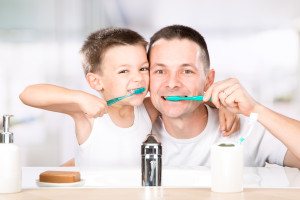 According to the American Dental Association, your DNA is not your dental destiny.
According to the American Dental Association, your DNA is not your dental destiny.
“Just because you have a DNA ‘marker’ associated with a particular disease, it does not mean you will ultimately develop the disease,” the ADA points out.
And that’s good news. Because it means the care you take of your teeth, the foods you eat, the dental treatments you undergo have far more impact on your oral health than your chromosomes. These are environmental factors, and when it comes to your teeth and gums, nurture trumps nature. Reduce your sugar intake, avoid nicotine, brush and floss regularly, and the result is far more likely to produce dental health, not genetic fate.
That being said, there are conditions that can run in the family. And since there are preventive steps you can take to reduce the odds you’ll be an affected family member, it’s good to know your odds. But even if you don’t, good dental hygiene practice means you are doing things to keep these conditions at bay:
- Gum disease—aka periodontal disease may be a genetic predisposition for up to 30% of the population. It’s starts with inflammation and sensitivity and can lead to decay and bone loss. But that’s not your destiny if you brush and floss regularly, eat low amounts of sugar, and get dental cleanings twice a year. If gum disease has been a problem for some of your family members, let your dentist know.
- Tooth decay—Research by the University of Pittsburgh School of Dental Medicine has revealed a connection between variations in the DEFB1 gene and a propensity for tooth decay. Again, if you have family members that have battled tooth decay, let your dentist know.
- Oral cancer—Genetic markers also show that some people are more inclined to get cancer from smoking or chewing tobacco. However, if you can quit—or never start—using nicotine products, you stand far better chances.
Meanwhile, there are some dental genetic matters that hygiene can’t fix, but that doesn’t mean you should address the issues with your dentist. They are:
- Misaligned teeth—Bone size, tooth alignment, and other factors that can cause your teeth to be misaligned run in the family. It’s recommended to fix these issues early with orthodontics (i.e., braces). The younger the set of adult teeth, the less and easier things are to fix.
- Cleft lip and cleft palate—Roughly 4,440 babies in the United States are born with a cleft lip, and roughly 2,650 are born with a cleft palate, CDC records say. These are genetic birth defects the sides of the lip and roof of the mouth don’t fuse together the way they’re supposed to. Resolving this matter goes beyond dentistry, but your dentist may be able to recommend an ear, nose and throat specialist who can help you out.
The good news in all of this is you have more control over your destiny than not. It starts with good tooth cleaning habits and an appointment with a dentist.







Leave a Reply